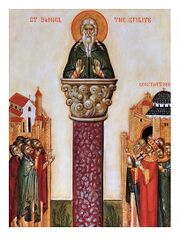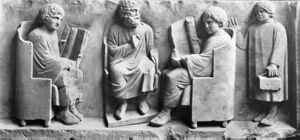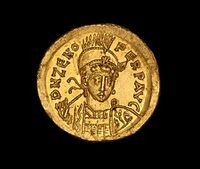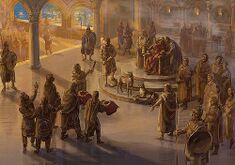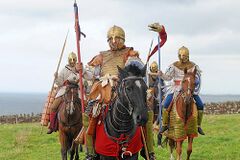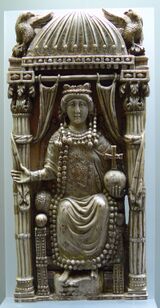Zeno
“Will someone give me a break?”
“I am officially paranoid”
In the 5th century, various religious men clambered up pillars and proclaimed themselves 'closer to God, further away from Man'. It started with St. Simeon 'Stylites' in the 420s, who had religiously dossed out on a pillar near Aleppo in Syria. He stayed there until his death 30 years later. In time, other religious men (no women tried this trick) also shimmied up spare columns to proclaim their sanctity. There they would stay, becoming living tourist attractions and objects of peasant adoration.
One particular 'holy man on a pillar' was St. Daniel the Stylite. He found his particular preaching perch near Constantinople. This column had been erected on private land to advertise a local temple building business. Daniel found it and refused to budge for the next 40 years. The land owner complained but was told holy men on pillars were exempt from eviction. Daniel gained powerful friends, despite looking like a desiccated scarecrow. One of these was a Roman general called Zeno.
Origins[edit]
Zeno was born in around 425 in the wild country of Isauria in Southeastern Asia Minor (Turkey). His original birth name was Tarasikodissa Kodisa Rousombladadiotes and he spoke a non-Greek tongue as his first language. Tarasis (as he was more likely to be called then) took the usual path of advancement in the Roman world by becoming a soldier, but his 'barbaric' name still meant he was disfavoured. So he changed it to Zeno, perhaps because he loved a paradox.
The future emperor soon got his sword bloodied in a battle in 447 against Attila the Hun. Zeno was congratulated for his 'saucy sword play' and promoted. This perhaps also got him first wife, a Roman aristocrat called Arcadia. She liked her 'barbarian rough' and they had a family. Two of their kids apparently ended up as saints whilst a son called Zenon went 'transgender' as a cute girl with ponytails.
Imperial marriage and a visit[edit]
In the 460s, Zeno's wife Arcadia died. Around then, Zeno met Doolally Daniel on his column. Zeno appears to have got hold of an extra long ladder to talk to the holy man. He told Zeno, 'Go to the Big City and give the Emperor this token.' It was a clump of hair from Daniel's head. Zeno took the gift and gained an audience with Emperor Leo I.
| “ | Leo: "So you met Mad Dan, the Saintly Man?" Zeno: "I did, Your Imperialness." Leo:"What did he say?" Zeno: "25, 47, 67, 74, 75, 76 and the bonus ball, 91." Leo: "That funny geezer gave me similar numerical advice. My bonus ball is 74." Zeno: "So this means something? What have I won??" Leo: "My daughter Ariadne's hand in marriage. I was waiting for the right chap." |
” |
Zeno was then presented with Ariadne, the eldest daughter of Leo and his wife Verina. The Imperial princess looked less than impressed by her new husband with his distinctly barbarian shaggy look and his newly acquired Greek name. Ariadne consented — if Zeno would change his barber — and the couple were subsequently married.
The new imperial-son-in-law had hoped to bring the rest of his family into the imperial court, but Empress Verina refused to go along with this. The newlyweds produced a young prince within a year of marriage, named Prince Leo (later emperor Leo II) after his grandpops. Zeno's position at court should have been secure, as he was the father to the next possible ruler of the Eastern Roman Empire, but this wasn't the case. Besides Verina, Zeno was also considered the enemy of emperor Leo's military master manipulater, Aspar. The latter's son Ardabur — a typical son of a powerful man and full of his own arrogance — hired assassins to kill Zeno, but they failed and filleted the wrong target. Taking that unsubtle hint, Zeno left Constantinople with his wife Ariadne and son Leo and took refuge in Chalcedon, just across the Bosphorus from the capital.
'Zenophobia'[edit]
Zeno stayed out of trouble by hiding a lot. It was with grim satisfaction that he saw Aspar and his family blamed by the old emperor for their deliberate sabotage of Leo's anti-Vandal expedition to North Africa. Aspar and his son were murdered on imperial orders. Zeno and Ariadne returned to Constantinople, but relations between him and emperor Leo were distinctly chilly. More to the point, Old Leo was considering bypassing his daughter and husband from become the next rulers and jumping to the next generation. This plan was supported by Empress Verina, who was quickly developing a pathological hatred of Zeno.
In January 474, Leo died. Empress Verina (now with a new lover, 'Paddy' Patricius) claimed the regency for her grandson, emperor Leo II. However, Ariadne resented her mother's scheming and insisted Zeno be crowned co-emperor with his son. Little Leo took little persuasion or it was no more playing with his toys. Zeno was now an emperor.
For six or so months, the arrangement held. However, in November 474, Leo died suddenly. Zeno and Ariadne had no other children and once again his 'fitness' to be emperor was questioned. Moreover, Verina had collected an alliance of people who all had a personal grudge against Zeno. In January 475, the conspirators made a move, fomenting rebellions across the capital city. Zeno and Ariadne quickly packed their clothes and fled to Isauria, where Zeno hoped to be safe.
Exile and return[edit]
Verina's alliance didn't last long. Her attempt to return to power with her boyfriend was blocked by her brother Basiliscus who became emperor instead. Back in Isauria, Zeno was opposed by a former colleague and fellow native called Illus. The later blockaded Zeno and Ariadne in their mountain retreat.
It would have seemed only a matter of time that Illus would capture Zeno, but the emperor was saved by the useless Basiliscus. Besides exiling his sister Verina and executing her lover Paulicius, Basiliscus had also engineered a massacre of Isaurians in Constantinople. This persuaded Illus to swap sides. Zeno and Illus then marched on the capital and re-entered the city in August 476. Zeno was back.
No more Western Roman Empire[edit]
Zeno promised an amnesty for all those who submitted to his restoration. He even let Basiliscus and family live for a few months. Though he had promised not to kill Basiliscus, he hadn't offered to feed him. Zeno cruelly dropped his rival, Basiliscus' wife Zenonis and their young son Marcus into a cistern where they were starved to death. How charitable!
Whilst this domestic drama was going on, the Western Roman Empire was finally collapsing into an ugly heap. Zeno had accepted Julius Nepos as his Western imperial colleague. but had not extended that welcome to Romulus Augustulus when he was placed on the throne in 475. At the same time Zeno had been recovering his capital from Basiliscus, what was left of the Western Roman army rebelled under their leader Odoacer and forced Romulus Augustulus to abdicate. No official successor was chosen. Odoacer 'prevailed' (i.e. forced) Romulus Augustulus to send an official letter to Zeno apologising for being a snivelling rebel kid. He enclosed his imperial regalia with the letter and anything else associated with the office of emperor. The Roman Empire was now now officially 're-united' under the authority of Zeno.
Zeno received the embassy from Romulus Augustulus with some amusement. He already had welcomed another delegation from the exiled Julius Nepos, congratulating Zeno for his 'amazing military skills' and requesting military help to restore him in Rome and Ravenna. Zeno begged off on the military assistance but wrote to Odoacer to 'recognise' Julius Nepos as the rightful emperor in the West. Odoacer agreed with the stipulation that Julius Nepos never come to Italy to actually exercise his rights. It was a uneasy compromise but held until 480 when Nepos was assassinated by Bishop (and ex-emperor) Glycerius of Salona and a few helpers. Zeno accepted the reality that there was only one emperor left. The Western Roman Empire was deader than the Dodo.
Family feuds[edit]
If Zeno had hoped his troubles were over after the brutal dispatch of Basiliscus, he was quickly disabused. New enemies now appeared and would often get into alliances with older foes. These now included his own sister-in-law Leontia (younger sister of Ariadne) who had married Marcian, a son of the late West Roman Emperor Anthemius. Once again Zeno's poisonous mother-in-law Verina joined in the conspiracy. This rebellion was quelled quickly with the assistance of Illus and saw the banishment of the guilty pair. Marcian was given a monk's haircut with bald patch whilst Leontia was sent to a nunnery to string rosary beads. Verina got another banishment (she was collecting these like parking tickets), something that even upset Ariadne this time.
All this time, Zeno was trying to find an acceptable successor-designate. He became friends with Armatus (a double defector and ex-lover of Empress Zenonis) and made his son Basiliscus 'Caesar' (i.e. a prince imperial contender). This Armatus also happened to be the brother of Odoacer in Italy but, in another twist of fate, Zeno had another member of this clan called Onoulphus kill the two-timing Armatus.[1] Armatus's son, Basiliscus the younger, fared better. He ended up as a trainee bishop and long survived everyone else connected with this tale of treachery and turncoating.
Yet another rebellion[edit]
Around 484, Illus finally tried to depose Zeno permanently. Empress Verina again supported anyone against her son-in-law. Illus was something of a rum bloke for the times. He had captured and imprisoned Zeno's own brother Longinus in 475 and had somehow kept hold of him despite the emperor's plea he be released. He was then given Empress Verina to 'look after', along with other members of the imperial family who had fallen out with Zeno. In turn, Empress Ariadne hired an assassin to kill Illus — but the dagger missed and cut off the general's ear instead.
The revised anti-Zeno alliance of Illus and Verina now produced a new emperor. This was one of Zeno's own generals, Leontius, who had flipped and joined the rebels. The war took on a new angle as it was now claimed Zeno was a Monophysite Christian, whereas Leontius said he was Orthodox Christian (supporter of the Chalcedonian position as regards Jesus's godly/human mix) with a dash of paganism. The rebels also received support from Odoacer in Italy, who invaded from the West. Illus's revolt initially looked dangerous, but an early defeat in the hands of Theodoric 'The Animal' Ostrogoth saw Illus, Verina, and others holed up in Papurius, a fortress in Cilicia.
Reduced to eating rats without seasoning, Verina died or killed herself. Illus and Leontius held out until 488, when their stronghold was betrayed and both got the chop for their pains. Finally, Zeno could rest. His formidable mother-in-law was dead and Illus, who had so scared him, was now officially dog meat. There was only one thing else to do: Solve the Ostrogothic problem.
Ostrogoths[edit]
Since the break up of the Hunnic empire, the various allied German and other barbarian tribes who had been forcefully enlisted in Attila the Hun's army had been hanging around the Balkans. The most powerful of these groups were the Ostrogoths, cousin black candle worshippers like the Visigoths. The Ostrogoths were keen to learn about Rome but at the same time make trouble. The Eastern Roman solution was to invite Ostrogothic princes to Constantinople to learn about civilization and how to clean your bottom with a sponge, rather than a clump of grass.
Two Ostrogoths stood out. One was called Theodoric 'Strabo' — aka 'The Squinter' — and the other was named Theodoric 'Amal' or 'The Animal'. They both hated Romans but marginally, hated each other more. Theodoric the Squinter had ended up in charge of the Germanic military formations in the Roman army and had got involved in the rebellion that had ousted Zeno the first time around. By the time Zeno had returned, Theodoric the Squinter had claimed loyalty to Zeno but mixed that up going home to his Ostrogoths and going on raiding operations. Equally dangerous to Zeno was Theodoric the Amal.
In an early example of Byzantine politics, Zeno tried to get the rival Ostrogoths to attack each other rather than him. The plan failed, but then in an accident of history in 481, Theodoric Strabo contrived to skewer himself when he fell off his horse in his camp and fell chest first on the pointy end of a spear, not covered by health and safety or insurance.
Now the leader of a united Ostrogothic nation, Theodoric made trouble in the Balkans for Zeno. Oddly, at the same time, he also supplied an army to defeat Illus and his emperor Leontius before going back to more raiding. Zeno tried to buy him off but then had a wizard idea. Odoacer was still a potential threat in Italy, why not set the two ruffians on each other? Zeno therefore supplied Theodoric with a mission and an official blessing. The Ostrogoths would invade Italy on behalf of the Roman Empire to dislodge the previous guys who were holding this imperial province under the same conditions. It worked. The Ostrogoths invaded Italy but then got locked into a long struggle against Odoacer. The Eastern Roman Empire at last had peace.
End of the story[edit]
Zeno lived on till 491. Considering how much he had gone through, Zeno could be classified as a success. His Christianity was of the distinctly Monophysite persuasion, but that gave him enough flexibility to deal with the Arian Christian Ostrogoths for example. The Nicene-Chalcedonian Christians (to become later the Catholics, Protestants and Greek Orthodox) were less thrilled by Zeno, but could not forget his great friendship with St. Mad Dan on the Pillar. So that made it sort of all right.
Perhaps Zeno's greatest disappointment was producing no heirs to carry on his dynasty. His transgender son Zenon died before him, and his prickly wife Ariadne rejected his deathbed request that she marry his brother Longius. She instead chose a pensioner and former bureaucrat called Anastasius I as her next husband and emperor.
Legacy[edit]
Zeno's reign had been full of incidents and near misses. He died officially as the sole Roman Emperor. The two halves of the Roman Empire were officially one state again, but with the Western section currently undergoing a squatters sit-in by the Goths, Vandals, Anglo-Saxons and the Franks. Perhaps a latter emperor would change this.
And the bonus ball was...91.
References[edit]
- ↑ Onoulphus would later join his brother Odoacer in Italy until dying at the hands of Theodoric the Great.
| Preceded by: Leo II |
Roman Emperor 474–491 |
Succeeded by: Anastasius I |
| ||||||||||||||||||||||||||
